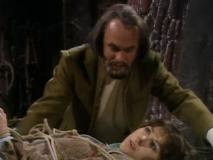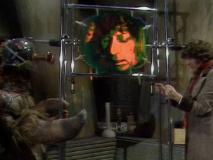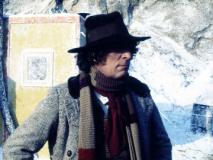Moments in Time - Goodbye Verity
Friday, 9 October 2015 - Reported by Marcus
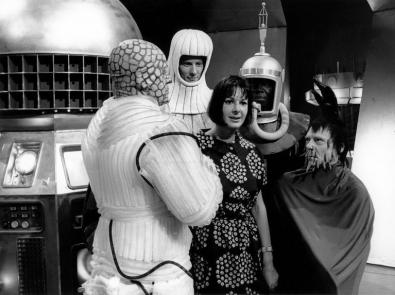
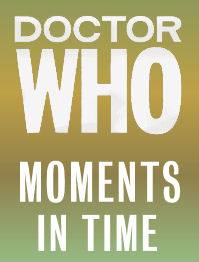 It was on Saturday 9th October 1965, fifty years ago today, that the last ever Doctor Who to be produced by the series first producer, Verity Lambert, was broadcast.
It was on Saturday 9th October 1965, fifty years ago today, that the last ever Doctor Who to be produced by the series first producer, Verity Lambert, was broadcast. Verity Lambert had decided to move on from the series at the end of the second year of recording. She had been with the series since June 1963, when BBC Head of Drama Sydney Newman recruited her to produce his new science fiction series.
As the BBC's youngest, and sole female drama producer, she had faced many battles within the Corporation and had steered the programme from its very uncertain beginnings to a point where it was attracting audiences of up to 13 million viewers to BBC One in the early evening.
Against the odds she had created a series which would run and run and, 50 years later, is one of the biggest global brands the BBC possesses.
Sydney Newman had no doubt where the success of the series lay, as he told Doctor Who Magazine in 1993
I think the best thing I ever did on that was to find Verity Lambert. I remembered Verity as being bright and, to use the phrase, full of piss and vinegar! She was gutsy and she used to fight and argue with me
Lambert's final story, Mission to the Unknown is unique in the history of Doctor Who in that it features neither The Doctor, or any of his current companions, who at the time were Steven and Vicki. The idea for the story was conceived early in 1965 when Terry Nation had been discussing ideas with the production team for the third production block of the series. Such was the success of the Daleks than another story involving them would be needed. A six part story, later to be expanded to twelve episodes, was commissioned from their creator along with a special 'trailer' episode for the story that would feature none of the regular cast and would be known as Dalek Cutaway.
The extra episode was to be scheduled at the end of the second year of recording. The absence of the regular cast would allow them all to have an extra week's holiday in the gap between the recording blocks for season two and three. Despite missing from the episode, William Hartnell would still be credited as his contract specified he would be credited for all episodes, a stipulation that did not apply to his companions Peter Purves and Maureen O'Brien.
Verity Lambert had effectively left the series by the time Mission to the Unknown was recorded, but her official contract with the series ended with the recording of the episode, in Television Centre Studio 3, on Friday 18th August. Her successor would be John Wiles, a BBC staff writer who had recently been promoted to producer. Script Editor Dennis Spooner was also moving on from the series, where he was replaced by Donald Tosh.
To help ease the transition, Lambert and Spooner wrote a document headed The History of Doctor Who, giving an introduction to the series. They were very keen to keep the internal history of the show intact and avoid conflicts in the story arc.
You will find listed below a thumbnail sketch of the serials transmitted and/or commissioned for Doctor Who. I think it is a point to bear in mind that any stories that are commissioned and are set in the future will have to be checked from their date point of view.... The Dalek serials have also to be watched with this in mind, as in the first Dalek serial (Serial B) Doctor Who did in fact wipe out the Dalek race. With a time machine at his disposal this is not as disastrous as it sounds, as he can go back to any point in their history; but one has to be careful in Serial B, K, R and in the Dalek story to come that they are true to the Dalek history calendar.
Another further note is that most writers call Doctor Who 'Doctor Who'. In fact he does not admit to this name, just the 'Doctor' part, and is never referred to as 'Doctor Who'. This is just the title of the show. Doctor Who comes from a planet that we have never named. Various references to it have been made in the scripts as the show has gone along, but I personally have not gone back looking for them all.
When Lambert left Doctor Who she was offered the producer role on a new BBC series Adam Adamant Lives! , as well as launching a new soap opera The Newcomers. Other productions for the BBC included a season of the crime drama Detective and a 26-part series of adaptations of the stories of William Somerset Maugham. Another further note is that most writers call Doctor Who 'Doctor Who'. In fact he does not admit to this name, just the 'Doctor' part, and is never referred to as 'Doctor Who'. This is just the title of the show. Doctor Who comes from a planet that we have never named. Various references to it have been made in the scripts as the show has gone along, but I personally have not gone back looking for them all.
 She left the BBC in 1969 to join London Weekend Television, where she produced Budgie and Between the Wars, before returning to the BBC to produce Shoulder to Shoulder, a series of six 75-minute plays about the suffragette movement of the early 20th century. In the 1970's she became Head of Drama at Thames Television, and was responsible for overseeing the work of Euston Films, Thames' subsidiary film production company, where she enjoyed the most sustained period of critical and popular success of her career. Her work included The Naked Civil Servant, with John Hurt, Rock Follies, Rumpole of the Bailey, The Sweeney, and Edward and Mrs Simpson. In 1979 she transferred to Euston films full time overseeing productions such as Quatermass, Minder and Widows.
She left the BBC in 1969 to join London Weekend Television, where she produced Budgie and Between the Wars, before returning to the BBC to produce Shoulder to Shoulder, a series of six 75-minute plays about the suffragette movement of the early 20th century. In the 1970's she became Head of Drama at Thames Television, and was responsible for overseeing the work of Euston Films, Thames' subsidiary film production company, where she enjoyed the most sustained period of critical and popular success of her career. Her work included The Naked Civil Servant, with John Hurt, Rock Follies, Rumpole of the Bailey, The Sweeney, and Edward and Mrs Simpson. In 1979 she transferred to Euston films full time overseeing productions such as Quatermass, Minder and Widows. In 1985 she established her own independent production company, Cinema Verity, producing the feature film A Cry in the Dark and the Channel 4 commissioned drama G.B.H. A less successful Cinema Verity production, was the soap opera Eldorado which was cancelled after a year. In the early 1990s, Lambert attempted to win the rights to produce Doctor Who independently for the BBC; however, this effort was unsuccessful because the Corporation was already in negotiations with producer Philip Segal in the United States.
Her work continued into the 21st Centurary, producing Jonathan Creek and The Cazalets for the BBC. Her last production was the comedy-drama, Love Soup.
Verity Lambert died on the 22 November 2007, the day before Doctor Who's 44th Birthday. A blue heritage plaque in her honour was unveiled by the Doctor Who Appreciation Society and the Riverside Trust, at Riverside Studios in Hammersmith, London in 2014.
SOURCES: The Handbook: The First Doctor – The William Hartnell Years: 1963-1966, David J Howe, Mark Stammers, Stephen James Walker (Doctor Who Books, 1994);Doctor Who Magazine (1993)
